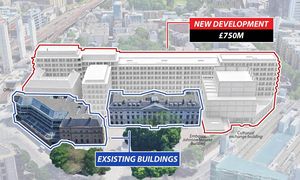The discussion surrounding the future of remote working at the Metropolitan Police has taken a contentious turn as the civilian staff have overwhelmingly voted to strike. The vote was put forth by employees who are facing new directives compelling them to return to the office at least three days a week after nearly three years of hybrid working arrangements due to the pandemic. The Public and Commercial Services Union (PCS)—which speaks for around 2,400 Metropolitan Police staff members—reported more than 50% of its members supported industrial action, raising alarms within the police community and beyond.
This strike vote marks the first time staff associated with the Met Police have supported such measures, underscoring the depth of frustration and dissatisfaction with the recent changes. According to the union, the returns to office policies do not take account of the unique challenges faced by employees, including those who juggle caregiving responsibilities or transport challenges, many of whom are women, part-time workers, or individuals with disabilities. Union officials have painted the mandate as not only inconvenient but as fundamentally unfair.
The Metropolitan Police has employed approximately 11,000 civilian staff, many of whom are integral to the police force's operations, including roles as 999 call handlers and child protection officers. Post-2021, these employees enjoyed flexible work options, with some even designated remote workers who only had to visit the office sparingly. The tightening of these policies is seen as regressing the advancements made during the pandemic when flexibility became necessary.
With the introduction of these new office policies, which would increase the time staff spend physically at police stations, concerns have been voiced about the impact of such measures on both staff morale and operational effectiveness. Senior officials within Scotland Yard argue the need for enhanced collaboration between desk staff and front-line police officers, indicating it is pivotal for supporting the public’s safety and trust.
Despite the push for more office time, the PCS union has countered this sentiment by asserting its members remain just as effective working from home. Fran Heathcote, the PCS general secretary, addressed these points head-on by asserting, “Our members are not bobbies on the beat. They are desk-based civilians who work from home just as productively as if they were in the office, but without the stress and cost of a daily commute.” This highlights the dual pressures of financial strain and logistical challenges associated with daily commuting for many employees.
The rise of hybrid working has dramatically shifted workplace expectations across various sectors, and the Met Police’s approach has drawn sharp criticism. Almost 91% of the votes cast also supported action short of strike, indicating readiness for negotiations, strategic gatherings, or other forms of protest should the situation escalate. The police force faces the prospect of internal strife just as it struggles with higher instances of crime and public safety concerns.
One significant figure within Scotland Yard expressed disbelief over the staff's stance. They pointed out the grave risks front-line officers endure daily, insisting it was hard to understand why some staff members resist returning to the office. “We have got officers risking their lives on the streets every day, so it beggars belief some staff are not willing to come to the office three days a week,” said the insider. This statement both reflects the challenges of balancing operational needs with employee satisfaction and reveals the cultural friction between operational staff and civilian workers.
The operational pressures on the police come at a time when funding and resources are becoming tighter due to financial shortfalls, which recently hit approximately £450 million. Conflicting directives between maintaining public safety, operational readiness through staff presence, and maximizing employee morale are becoming increasingly complex. Critics worry the shift away from flexible arrangements may place additional burdens on front-line officers, who might have to cover civilian duties if support staff refuse to comply with new protocols.
Meanwhile, the Met Police has reassured the public, stating, “Although the threshold for strike action has been met, it doesn’t have to go ahead and we urge our staff and the union not to take action.” They cited contingency plans already established to address any potential disruptions caused by staff shortages, which might arise with any industrial action, indicating their commitment to maintaining service levels to the public.
Heathcote also called for listening to both the workers and the data from various studies proving working from home can be just as effective, stating, “It’s time politicians and the right-wing media stopped their obsession with telling people where they have to work and started listening to the evidence of academics, employers, and employees.”
Even as the vote is counted and preparations for potential strike action begin, the friction within the Metropolitan Police's civilian ranks serves as a microcosm of larger shifts across the workforce grappling with post-pandemic dynamics. The decision reflects broader societal questions about workplace flexibility and the balance of power between organizations and their employees.
For now, the tension between returning to traditional office models and maintaining the flexibility employees have grown accustomed to remains unresolved. The union's future actions could play out against the backdrop of pressing public safety concerns, and the consequences of these decisions will likely resonate within both police operations and civilian workplaces across the UK.
Such trends indicate this could be just the beginning of employees seeking more autonomy and satisfaction with their working conditions, which may lead to more widespread changes across sectors, including law enforcement. The Metropolitan Police's future policies will no doubt be watched closely as they navigate these trying waters.



